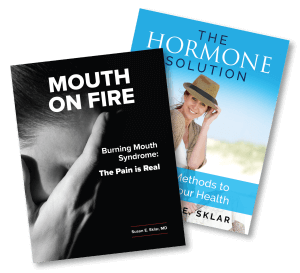Emotional Disorders: The Brain-Body Connection
Callie came to see me for anxiety. She is a busy homemaker and school principal. Callie, a trim, nervous appearing, middle-aged woman told me “I feel like I’m crawling out of my skin. It started with anxiety just before my menstrual periods and in the past couple of years, with my periods getting more irregular, it’s all the time.”
At home, her family walked on eggshells. They didn’t know when she would react in anger. “I don’t want to go on prescription anxiety or depression medicine,” she said. “My family and my doctor are trying to get me on a sedative medication like Valium along with an anti-depressant medication. I’m scared about side effects and I don’t want to risk becoming addicted to a sedative. Plus, I can’t be sluggish on the job. I have a whole school to take care of. I’m looking for another solution.”
With her reluctance to use them, her doctors thought she was being difficult, and her family was puzzled. In short, Callie’s problem is an example of what millions of American go through when they experience emotional distress.
One of the biggest injustices to the American public is modern medicine’s view of emotional disorders. Modern medicine looks at a patient as separate body systems. The mind ends up completely cut off from the body. This leaves emotional problems to one set of specialists, the psychiatrists. In our country psychiatrists treat patients almost exclusively with prescription medications. Moreover, they use these medications to balance brain chemicals as if the mind were a laboratory with test tubes of chemicals to be mixed and combined. And they do this without an understanding that there are underlying causes of mental problems.
While there certainly is an emotional part to many mental problems, there are wide-ranging physical and physiological reasons for people to have emotional disorders. Emotional disorders are problems such as anxiety, depression, obsessive-compulsive disorder, and attention deficit disorder. Also, there are even more serious ones such as schizophrenia and bipolar disorder.
Ignoring the brain-body connection deprives millions of patients with emotional disorders of a long-lasting solution to their problems. Some medications may cause people to consider suicide and others are addicting. This leaves large numbers of people either ineffectively treated, exposed to serious risk, or untreated because, like Callie, they fear the side effects of the medications.
THE ANXIETY AND DEPRESSION EPIDEMIC
Anxiety and depression are epidemic in the United States. The National Institute of Mental Health estimates that each year almost 20% of adults have depression or anxiety. That amounts to almost 44 million adults.[1] Women are 50% more likely than men to suffer from depression and anxiety in their lifetime.[2] Also, women are twice as likely as men to use an anti-depressant.[3]
The use of antidepressants increased 65% between 1999 and 2014 according to the National Center for Health Statistics.[3] Furthermore, the global revenue for anti-depressants was $13 billion in 2018 and is expected to reach $16 billion by 2025.[4] This results in huge profits for the pharmaceutical companies. These companies promote medications as a solution for these problems but they are a band aid approach which may cover up symptoms and fail to get at the real cause of emotional disorders.
There are serious problems with depression and anxiety medications. Callie was worried about addiction, and rightly so. Most anxiety lowering medications are in a class called benzodiazepine (“benzos” for short). Benzos are highly addictive. Drug companies say anti-depressants are non-addictive. It is well known that many anti-depressants cause intolerable withdrawal symptoms.[5] For some it is nearly impossible to stop taking them.
Many antidepressants have side effects such as decreased libido. For men sexual side effects interfere with intimate relations. These medications can hurt quality of life. This is shown by worse health and fewer social interactions especially for women.[6]
Moreover, statistics have shown that medications for depression work only a third to half of the time.[7] For half of the these studies, there was no difference between the medication group and the placebo (dummy pill) group.
How Do You Know If You Have An Emotional Disorder Like Anxiety Or Depression?
Take Our Emotional Disorder Test
Signs of Anxiety:
- Do you feel overwhelmed by the daily tasks you previously do with ease?
- Do you worry excessively?
- Do you have feelings of nervousness or panic for no reason?
- Do you have feelings of dread or a “knot” in your stomach?
Signs of Depression:
- Do you feel like you are not enjoying life?
- Do you feel sad for no reason?
- Have you lost pleasure in your hobbies and other things that previously brought you enjoyment?
If you said yes to two or more these questions, you should seek help.
SO, WHAT ARE THE REAL CAUSES OF ANXIETY AND DEPRESSION?
Depression and anxiety can have many causes. There are psychological and emotional reasons for them. As a functional medicine specialist, I am going to address the physical causes. Traditional Western medicine often ignores the physical causes.
There are also many physical reasons for depression and anxiety. Hormonal causes, for example.
- Hormone imbalances and deficiencies that occur with menstrual cycling, menopause, or aging.
- Imbalances of important brain chemicals called neurotransmitters can cause anxiety or depression.
- Inflammation is another cause of anxiety and depression. Most people are aware of inflammation having something to do with causing heart disease, but the same is true for emotional problems.
- Gastrointestinal problems such as food allergies, parasite infections, and yeast overgrowth can cause inflammation and affect the production of neurotransmitters.
- Stress can also cause neurotransmitter imbalances.
- There also can be nutrient deficiencies due to poor diet or poor digestion that will contribute to mood problems.
- Genetic abnormalities can contribute to emotional problems. Genes determine our methylation ability. Methylation is an important chemical process involved in over 200 places in our bodies including manufacture of neurotransmitters and detoxification of hormones. This is one of the ways genetics affects emotional problems.
HORMONES: FOOD FOR THE BRAIN
Callie is a classic example of an underlying problem—hormone imbalance–contributing to an emotional disorder. With the menopause transition, her important brain calming hormones–estrogen and progesterone–were on the decline.
When we think of hormones, we usually think of hot flashes or erectile dysfunction, but in fact hormones are potent brain activators. Our hormones affect emotions in multiple ways.
Estrogen is the predominant hormone in women. Its production starts with puberty and ends with menopause. In between, it’s a rollercoaster.
Estrogen levels rise and fall with the menstrual cycle. During pregnancy, estrogen levels are sky high. During the transition from reproductive life to menopause, levels become erratic, sometimes very high and sometimes very low. Eventually, there is almost no estrogen production when menopause happens.
MENOPAUSE AND EMOTIONAL DISORDERS
Estrogen’s Role in Emotional Disorders
The decline and eventual complete lack of estrogen has important mood effects for women. Hot flashes and sleeplessness due to low estrogen levels are a recipe for depression. The menopause transition has been associated with more than double the risk of depression of other time periods in life.[8]
Not only does low estrogen cause depression, scientific studies have shown that estrogen is an effective treatment for depression at this time of life. One excellent study on the effect of taking bioidentical estrogen for depression during peri-menopause and post-menopause showed great results. Depression disappeared in 68% of women and the effect lasted even after they stopped taking estrogen.[9]
Progesterone’s Role in Emotional Disorders
Progesterone, the other major female hormone also cycles up and down during the menstrual cycle. In perimenopause, its levels become erratic and unpredictable. Finally, at menopause, there is very little, if any, produced. The effects of this are profound. Anxiety increases during perimenopause. Women who previously did not experience anxiety can become anxious. In addition, those who already experienced anxiety can go on to develop full blown panic attacks, a more severe form of anxiety.
Progesterone in its natural form is a hormone that calms the brain. This improves sleep and relieves anxiety. Studies have shown that treatment of women with bioidentical forms of estrogen and progesterone results in a 25% reduction in moodiness, irritability and anxiety.[10]
Remember my patient Callie? She was correct in resisting the use of medications for her emotional disorder. Once she experienced restoration of her estrogen and progesterone hormones, she felt calmer, more resilient, and had increased ability to handle stress. Her panic attacks stopped within the first month of treatment. She no longer became angry at home. The co-workers and students at her school no longer walked on eggshells when they spoke to her. She was a much happier person and her family was happier also.
WHAT ABOUT MEN AND HORMONES?
Another one of my patients, Harold, was a 53-year-old executive with many business ventures. He was busy at work and at home with a new young wife. But he was not happy. He said, “I’ve lost my drive. I’m not enjoying myself. I have no desire to golf, ride horse, or play racquetball like I used to. But the main thing on my mind is the new baby that is on the way. I want to enjoy my child.”
Without saying it in words, Harold was expressing feelings of depression. He also had been experiencing sexual function problems, another sign of hormone decline. He especially didn’t want to take antidepressant medication because he had heard that it can make sexual function problems worse. Harold was correct about that. Measuring Harold’s testosterone level and restoring his testosterone to a normal level was all it took. Harold felt like a new person when his levels rose. His businesses thrived along with his new family.
TESTOSTERONE IS FOOD FOR MEN’S BRAINS
Testosterone is food for men’s brains. Testosterone is the main hormone for males but it is also important for women. Levels decline during a man’s transition from youth to midlife and beyond. As a man’s testosterone level decreases, mood changes may occur. Statistics show that depression and anxiety increase when men have falling levels of testosterone. The good news is that giving testosterone helps alleviate depression.[11]
INFLAMED BRAIN–CHEMICALS ARE OUT OF BALANCE.
Hormones are important chemicals related to mood but others, called neurotransmitters, are the communicators in the brain. Neurotransmitters can become unbalanced for many reasons—inflammation, poor diet, intestinal infections, stress, and hormone depletion. Frequently, inflammation directly triggers mood problems. Inflammation is like an internal fire. Inflammation anywhere in the body can show up as depression—or anxiety.
Hormone deficiencies also can cause neurotransmitter imbalances. Estrogen helps to support serotonin, the brain chemical that is our hedge against depression. And it turns out that progesterone supports GABA (gamma-amino butyric acid), the most calming of all our brain chemicals. When these and other neurotransmitters are out of balance our brains don’t function properly. We end up with emotional problems like depression and anxiety.
THERE IS A GUT-BRAIN CONNECTION IN EMOTIONAL DISORDERS
One of the biggest failures of conventional psychiatry is the lack of understanding that intestinal health is the foundation of good health in general and brain health specifically. Poor diet, sensitivities to foods, as well as intestinal infections cause mood problems. “B” vitamins, protein, magnesium, and zinc are essential nutrients for good emotional health. When these are missing due to poor diet or poor digestion, the gut-brain connection shows up as anxiety and depression.
FOODS ARE MAKING US SICK.
Another one of my patients Denise came to me with problems with sleep, irritability, and depression. At 51, She was also entering the menopause transition with her periods spaced out at 6-month intervals.
She was a physician who ran a busy cosmetic surgery office. Around the same time, she began to have stomach symptoms. After testing and biopsies, the verdict was in—ulcerative colitis, an inflammatory bowel problem. For years she had suffered with attacks of colitis, sometimes being unable to go more than a few steps from a bathroom.
I ordered testing for food sensitivities. Her tests showed a problem with digestion of gluten which is a protein found in wheat. I counseled her on a gluten free diet and eventually how to remove all grains from her diet since she felt the best without any type of grain. Her colitis symptoms decreased by 90% and so did her depression and her insomnia.
There is a lot of scientific information about celiac disease and increased risk of depression. Celiac disease is an autoimmune condition where your body turns on itself and attacks your organs. This happens in people who are genetically susceptible.
Eating wheat and other grains sets off a series of reactions in these people. They suffer from symptoms that include intestinal pain and bloating. But they can also have emotional disorders like depression and anxiety.
There also are many people who do not have celiac disease but are extremely sensitive to wheat. Wheat can cause mood problems in people who are sensitive, even if they don’t have intestinal symptoms and even if they do not truly have celiac disease.
INTESTINAL INFECTIONS CAN TRIGGER ANXIETY.
Frank came to see me for anxiety He is an energetic self-employed architect with uncontrollable anxiety and panic attacks. “I feel like I’m crawling out of my skin. I’ve had a number of recent life upsets, but I can’t sleep and can’t function with these panic attacks.”
He said that he had experienced anxiety since high school and that a recent romantic breakup had tipped him over the edge to full blown panic attacks. Although he didn’t have any significant intestinal symptoms, his world travels made me suspicious that he might have intestinal parasites. Testing confirmed two intestinal parasites. A combination of medications and natural supplements got rid of the parasites. His panic attacks went away. Moreover, his underlying anxiety was greatly reduced.
Frank’s story is an example of how gastrointestinal upset can affect an organ at the other end of the body—the brain. Our organ systems are interconnected along a vast and complicated highway. These interconnections supply an opportunity to find the real solutions to our problems.
WHAT ARE THE REAL SOLUTIONS TO EMOTIONAL DISORDERS?
What I am saying is revolutionary. Treatment with hormones can relieve depression. Relief of stomach problems can relieve your panic attacks. Replacing necessary vitamins and minerals can help anxiety. The most effective treatment is a combination of therapies. Counseling and an investigation and treatment of the underlying physical causes is required.
If you’ve been dealing with anxiety and depression for far too long, it’s time to take charge and reclaim your life. Call us today at 562-596-5196 for an evaluation. Our Anxiety and Depression Relief Program can help you get the help you need.
References
- National Institute of Mental Health
Any Anxiety Disorder
NIMH Statistics. November 2017.
LINK: Any Anxiety Disorder - National Institute of Mental Health
Prevalence of Any Anxiety Disorder Among Adults
NIMH Statistics. November 2017.
LINK: Prevalence of Any Anxiety Disorder Among Adults - Laura A. Pratt, Ph.D., Debra J. Brody, M.P.H., and Qiuping Gu, M.D., Ph.D.
Antidepressant Use Among Persons Aged 12 and Over: United States, 2011–2014
NCHS data brief, no 283. National Center for Health Statistics. 2017.
LINK: Antidepressant Use Among Persons Aged 12 and Over: United States, 2011–2014 - BRANDESSENCE MARKET RESEARCH COMPANY PVT LTD
Antidepressant Drugs Market Size, Share, Current trends, opportunities, Competitive Analysis and Forecast to 2019 – 2025
BMRC 879. Aug 2019.
LINK: Antidepressant Drugs Market Size, Share, Current trends, opportunities, Competitive Analysis and Forecast to 2019 – 2025 - Jonathan Henssler, Dr. med., Andreas Heinz, Prof. Dr. med. Dr. phil., Lasse Brandt, and Tom Bschor, Prof. Dr. med.
Antidepressant Withdrawal and Rebound Phenomena
Dtsch Arztebl Int. 2019 May; 116(20): 355–361.
LINK: Antidepressant Withdrawal and Rebound Phenomena - Drug AlcoholDep 2014 study
- Statistics have shown that medications for depression work only a third to half of the time
- Gordon JL, Girdler SS.
Hormone replacement therapy in the treatment of perimenopausal depression.
Curr Psychiatry Rep. 2014 Dec;16(12):517.
LINK: Hormone replacement therapy in the treatment of perimenopausal depression. - Soares CN, Almeida OP, Joffe H, Cohen LS.
Efficacy of estradiol for the treatment of depressive disorders in perimenopausal women: a double-blind, randomized, placebo-controlled trial.
Arch Gen Psychiatry. 2001 Jun;58(6):529-34.
LINK: Efficacy of estradiol for the treatment of depressive disorders in perimenopausal women: a double-blind, randomized, placebo-controlled trial. - Andres D Ruiz, Kelly R Daniels, Jamie C Barner, John J Carson, and Christopher R Freicorresponding author
Effectiveness of Compounded Bioidentical Hormone Replacement Therapy: An Observational Cohort Study
BMC Womens Health. 2011; 11: 27.
LINK: Effectiveness of Compounded Bioidentical Hormone Replacement Therapy: An Observational Cohort Study - William Vogel, Edward L.Klaiber, Donald M.Broverman
Roles of the gonadal steroid hormones in psychiatric depression in men and women
ScienceDirect, Progress in Neuro-Psychopharmacology. Volume 2, Issue 4, 1978, Pages 487-503.
LINK: Roles of the gonadal steroid hormones in psychiatric depression in men and women
Download Your Free eBook




